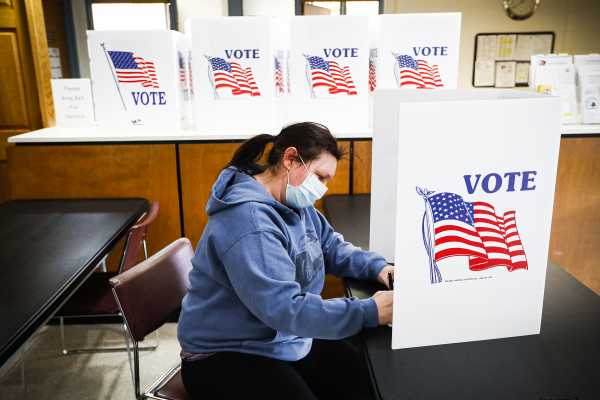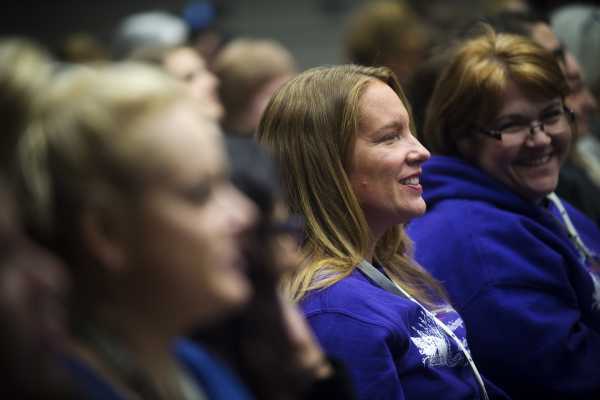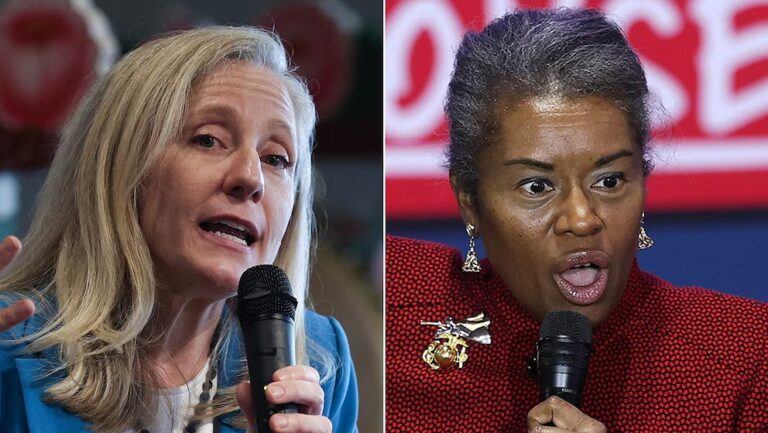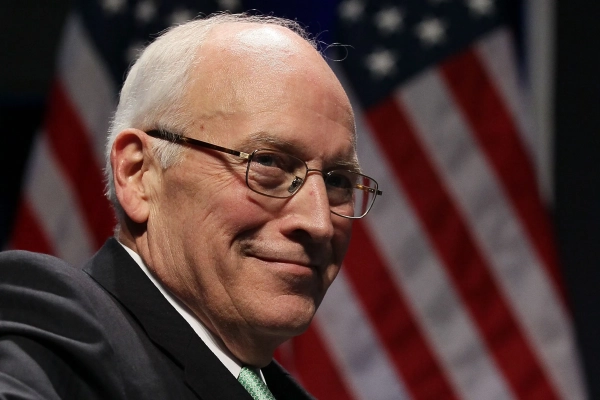
When she decided to run for state representative in the 98th District of Michigan, Democrat Sarah Schulz began putting together a traditional campaign infrastructure. She had unsuccessfully run for the same seat — which represents a portion of northeastern Michigan centered on the city of Midland — in 2018, and had a strategy for winning the traditionally conservative district this fall. So she built a list of volunteers and made plans for door-knocking campaigns and in-person events, the cornerstones of “retail politicking.”
But everything changed when the coronavirus pandemic hit.
“We had a Zoom meeting the Sunday after the schools started closing, and I said, ‘What are we going to do for our community right now?’” Schulz told Vox. Her idea, she said, was to mobilize her small army of volunteers to assist those most at risk of Covid-19. Up first was establishing a delivery service for folks who were homebound, but it wasn’t long before Schulz realized that, as in much of the United States, personal protective equipment (PPE) was a scarce resource in the 98th District.
So she and her volunteers started making homemade masks.
“I have about 70 or so folks who are in their homes right now, just making masks. And we’ve provided close to 5,000 masks in our community so far,” Schulz told Vox in mid-April. “First of all, it’s a community service. But from a campaign perspective, it’s like, what we’re doing is showing instead of telling. What does it look like when you have a people-centered leader?”

This is just one example of how candidates are looking for creative ways to campaign in a high-stakes election cycle that offers Democrats a chance not just to retake the White House and Senate, but to take control over statehouses as well.
Since 2020 is a census year, whichever party controls the statehouse following the elections will control how districting will work for the next decade. Republicans swept into power in 2010, and subsequently used gerrymandering to stay in power in states like Wisconsin and North Carolina — even in elections in which they won a minority of statewide voters. Democrats hope to use new census data to their advantage, and are counting on candidates like Schulz to do so.
The pandemic has complicated the party’s plans, however. State-level candidates who depend on retail campaigning — knocking on doors, meeting voters face to face in their community — have been forced to abandon some of the cornerstones of local campaigning and have thrown themselves into more digital campaigning.
“Normally the gold standard is face-to-face interaction to build relationships,” said Kelly Dietrich, CEO and founder of the Democratic Training Committee. “Now you can’t do that gold-standard face to face, but the goal is still the same. You still have to build a relationship with people to convince them to vote for you.”
According to Dietrich, state and local campaigns have had to adapt by launching texting initiatives and ramping up phone-calling measures in order to reach voters. Some others, like Schulz and her mask-making operation, have found creative ways to campaign and catch the attention of voters without having to go door to door.
Republicans have ramped up their digital operations, too. “State Republicans all over the country are adapting to the challenging circumstances evolving around us — we’re proud of their work and we’re here to help however we can,” said RSLC national press secretary Lenze Morris in a statement to Vox. “We have encouraged candidates to use innovative techniques, including videoconferencing, scheduling tele-town halls, and even bolstering their paid digital content to ensure key messages are still reaching intended audiences. These are uncertain times, but the mission remains the same: win.”
Literally running for office in North Carolina
Sarah Crawford, a Democrat campaigning for state Senate in North Carolina’s District 18 (which covers parts of Raleigh), is, by her own admission, not the greatest runner. Nonetheless, she says she’s found it to be a wonderful outlet for her energy, as well as a way to connect with family. She started running to spend more time with her dad, who is a runner. In 2017, they ran together in the “Dopey Challenge,” a grueling four-day, 46.8-mile set of races at Disney World.
When the pandemic hit, Crawford was forced to abandon her traditional in-person campaigning and fundraising. “We typically host house parties with hors d’oeuvres and beverages and with a special guest … and of course I go out and knock doors,” she told Vox. But “during this pandemic, all of those things are off the table.”
While she was thinking through some ideas for digital campaigning, a new one struck her: a virtual 5-kilometer race.
“I’m in a lot of different run groups on Facebook, and everybody was talking about all of the races being canceled. The races that I had signed up for myself were being canceled,” she said. “I thought, ‘Oh, my gosh, I could host a 5k. How cool would that be?’”
The rules of the race, which she named the “Run, Vote, Win 5k,” were simple: There was no set route, you could go at your own pace, and, most importantly, you could do it while socially distancing. “It’s virtual. You can run it, you can walk it, you can do it on the treadmill. My husband says you can even drive it if you want. I kind of think that’s cheating,” she said.
While the race helped Crawford advertise her campaign, it also allowed her to get her message out to folks who maybe weren’t yet paying attention to local politics, especially in the middle of a pandemic.
In addition to the race, Crawford has also adapted to doing more digital and phone campaigning. And she notes doing so has allowed for conversations she may not have otherwise had, particularly around the issue of child care: “I’m having really rich conversations about what people are going through and what they’re experiencing and how they’re managing working from home and their children,” she said.
Should Crawford win her state Senate race, she’d be one of the five pickups Democrats need to retake the chamber. The party would also need to flip six state House seats to retake control of the statehouse. Flipping 11 seats won’t be easy, but Democrats hope to pull it off this fall.
“There is certainly optimism among North Carolina Democrats that the party can continue to build on the gains it made in 2018. For starters, the previously used state-legislative map that was drawn to the advantage of Republicans is no more. The newly drawn map offers a few additional opportunities for Democratic gains in 2020,” Peter Francia, director of the Center for Survey Research and professor of political science at East Carolina University, told Vox in an email.
And giving some North Carolina Democrats hope is the fact that, besides the redrawn map, national politics are expected to play a role in the state as well. Trump’s approval rating has been below 50 percent there throughout 2020, and many polls show presumptive Democratic nominee Joe Biden leading in the presidential race. If those polls hold, Democratic candidates like Crawford may see their campaigns boosted by Biden’s popularity.
Despite that, Francia still thinks retaking the statehouse is an uphill battle for Democrats. “Democrats could certainly pick up some more seats in both the State House and State Senate. But can they win big enough to capture a majority? It’s not impossible, but probably unlikely,” he said.
Michigan politics has become part of a national battle about Covid-19
Michigan Democrats similarly hope to take full control of their state — but the effort has been complicated not just by the pandemic’s effect of campaigning, but the fact that the state has become a microcosm of the pandemic politics playing out at the national level.
Detroit was one of the earliest cities in the US to see an outbreak, and as of July 13, more than 6,000 people have died of Covid-19 statewide — with more than 69,000 confirmed cases overall, according to Michigan state data. Rapidly rising case counts in March led Gov. Gretchen Whitmer (D) to swiftly implement a statewide lockdown.
That lockdown — and Whitmer herself — was protested by armed citizens, who were allowed into the statehouse in April demonstrations. President Trump cheered on the protesters from afar, tweeting encouragement to “Liberate Michigan,” along with several other states led by Democratic governors.
All that may suggest that Democrats — including one who organized a mask-making operation — face an uphill struggle in their efforts to win the state. But according to Michigan pollster Bernie Porn, president of Epic-MRA, that’s not the case. And those anti-lockdown protesters are a decided minority in the state.
“The polling that we did [shows Whitmer] in the 60 to 70 percent [range] in her positive job rating, and she’s even higher in terms of her handling of the coronavirus,” Porn told Vox.
But that hasn’t stopped Republicans in the state legislature — including Annette Glenn, Schulz’s opponent — from embracing the spirit of those protests. The Republican-held legislature ultimately voted to revoke Whitmer’s emergency declaration on April 30 as protesters looked on. Republican state legislators are now preparing to sue the governor over her shelter-at-home order, despite a state court ruling Wednesday that said the order was constitutional.
Michigan Democrats see a stark divide between what Porn’s polling shows the public wants and what its lawmakers are delivering. They also note that the economic resurgence Republican officials touted in their push to reopen nonessential businesses hasn’t materialized — and they see opportunity in both.
Democrats in Michigan need just four seats to pick up the majority in the state House, and six on the Senate side. According to Porn, the presidential election factors heavily into which party controls the Michigan statehouse. According to Epic-MRA’s latest poll of 600 likely voters in Michigan, Biden leads Trump by 14 percentage points (the poll has a 4 percentage point margin of error). The presidential election is expected to boost voter participation, and if Biden is able to boost the vote share of down-ballot Democrats — as polls suggest he could do — Porn said, November 3 will be a very good day for Michigan Democrats.
“When there is a wave election, it’s a little bit like watching The Poseidon Adventure at that one point where the swell of water is about to envelop the SS Poseidon,” he said. “That’s probably a little bit like a lot of Republican candidates are starting to feel about the polling that they’re hearing about or seeing in their races.”
Texas Democrats hope 2020 will be the year the state finally becomes competitive
Like her counterparts in North Carolina and Michigan, Texas Democratic state House candidate Elizabeth Beck found her campaign thrown for a loop by the pandemic. She’s running for state representative in House District 97, which is a suburban district covering the southwest portion of Tarrant County, home to Fort Worth.
Like Democratic candidates in other states, she had been preparing a traditional campaign before Covid-19 hit, and subsequently was left scrambling for ways to catch voters’ attention in the aftermath of the pandemic.
After doing a little brainstorming, she teamed up with several other Democratic women running for office to produce a video based on the makeup brush video meme that had been popular this spring. But instead of showing the women transforming into beauty queens, they ended up in their campaign gear.
“You have this campaign that you thought you knew exactly when and where you were going to do things, and all of that’s been upended,” she told Vox. “That has led to some sleepless nights, and one of those nights, I fell down a bit of a rabbit hole on Twitter watching these videos. … And I thought, ‘That seems kind of fun.’”
The tweet went low-key viral and garnered some much-needed early attention for Beck, whose district has gotten steadily more Democratic over the past decade.
Many eyes will be on Texas on Election Day this year. Pundits have watched the deep-red state’s shifting demographics and wondered whether it’s a matter of when, not if, Texas finally goes blue. Former US Rep. Beto O’Rourke came closer than any Democrat in recent memory to winning a statewide race in 2018 when he faced off against Republican Sen. Ted Cruz, and Biden has held a lead or run close with Trump in many recent polls.
Those polls have caught the attention of local political experts. “We used to say in the spirit of Tip O’Neill, ‘All politics are local,’” Texas Christian University political science professor Jim Riddlesperger told Vox. “The truth is that in 2020, in many ways, all politics have become national.”
According to Riddlesperger, it’s unlikely though not impossible for Democrats to win the 13 seats they would need to take over the Texas state House. The state Senate is probably more out of reach for Democrats this year, however. The problem for Democrats in the state is that there are simply more Republican voters. But the fact that Texas is competitive is a political statement on its own.
“It’s an exciting time to watch Texas politics because you can’t just simply put a red star over Texas as you’ve been able to do since 1980 and say that Texas is irrelevant in national politics,” said Riddlesperger.
And as in North Carolina and Michigan, the pandemic is having a very real effect on those state politics: Covid-19 is a very immediate and personal political issue for folks who have had a loved one die or become seriously sick with it, noting case numbers have risen above 264,000, and more than 3,200 Texans have died of the disease as of July 13, according to state data.
Voters, Riddlesperger said, can’t just ignore that. A recent CBS News/YouGov poll in the state shows that 43 percent of 1,212 likely voters said Trump is doing a “very bad” job of handling the pandemic. State-level Republicans have seen this and have started to break with Trump on the issue. For instance, Texas’s Republican Gov. Greg Abbott instituted a mask mandate for most counties and suggested they may have to roll back their reopening.
It’s this sort of reticence to mandate basic protective measures that has many Texas Democrats optimistic about their electoral chances — Beck said she sees it as dissolving the advantage incumbents normally enjoy.
“If an incumbent is doing their job right and being a leader and using the position of their office to help people and to ease this burden for folks, I say it would probably be beneficial for an incumbent,” she said. In her district, “I don’t think that that’s necessarily the case.”
Support Vox’s explanatory journalism
Every day at Vox, we aim to answer your most important questions and provide you, and our audience around the world, with information that has the power to save lives. Our mission has never been more vital than it is in this moment: to empower you through understanding. Vox’s work is reaching more people than ever, but our distinctive brand of explanatory journalism takes resources — particularly during a pandemic and an economic downturn. Your financial contribution will not constitute a donation, but it will enable our staff to continue to offer free articles, videos, and podcasts at the quality and volume that this moment requires. Please consider making a contribution to Vox today.
Sourse: vox.com






